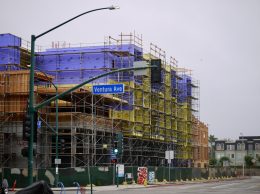Lakireddy: State needs policies that increase housing supply
IN THIS ARTICLE
- Latest news Topic
- Guest commentary Author
By Guest commentary Friday, June 14th, 2019

Sid Lakireddy
By Sid Lakireddy
With the pressing need to relieve the housing shortage, there has been multiple legislative proposals to address this growing crisis. Some proposals are bold and challenge the norms — such as SB 50 by state Sen. Scott Wiener — while others continue to repackage failed decades-old policies that have not resulted in more accessible and affordable housing.
We represent a diverse group of rental home providers who often live in the communities with our residents. We understand what is working, and what discourages investors from taking a risk to create more rental housing.
Two bad ideas that were presented in Sacramento are rent control and just cause eviction policy. While the just cause legislation did not advance, the rent control bill was voted by the state Assembly and advances to the state Senate. Rent control was overwhelmingly rejected by California voters in November, and is overwhelmingly panned by academics and experts for shrinking or stagnating housing.
In Santa Barbara, the city council approved a “just cause” ordinance last month, which would require landlords to offer one-year leases, and potentially prohibit evictions for reasons outside of nonpayment of rent and violation of rental agreements. Although this might still need to go back for a final approval this summer, the consequences will be harmful for Santa Barbara renters as has been the result in other cities with similar ordinances.
Just cause eviction policies exist in 17 of the state’s 482 cities and have harmed law-abiding tenants, increased costs and discouraged additional housing. In San Francisco alone there are about 30,000 empty rental unit properties. We can point to harmful policies like just cause eviction as part of the reason these units are not on the market.
In those cities, we cannot easily remedy the situation for our good tenants when another tenant is violating the lease agreement, fails to pay rent, creates nuisances, or conducts criminal activity such as drug-dealing. The current eviction process on average takes four to six months and costs $35,000 or more in legal fees, not to mention the loss of rental income if the tenant is not paying rent.
As a result, law-abiding renters are left in the position of having to live with difficult neighbors, who may even create a hostile community. This is a violation of law-abiding renters’ rights and would have been made worse by a statewide just cause law.
Further, it would not help the residents in the 17 cities that have enacted a just cause eviction policy. Remember, the 30,000 vacant rental properties in San Francisco are still vacant. When just cause goes into effect, Santa Barbara could face thousands of empty units, making housing less accessible.
We look forward to further conversations at the state and in our communities on how to create housing for everyone. Key elements of a solution should include:
• Permanent shelving of decades-old policies that do not work like just cause and rent control.
• Creation of more incentives for California property owners to offer properties for rent.
• Embracing bold policies that encourage more housing around transit and where people work.
• Encouraging new innovative housing concepts that address the growing middle income and workforce housing shortage.
We know this will not be easy or immediate, but we have the opportunity to end the housing shortage with better policies. We are encouraged with the legislature’s actions to reject some of the failed policies that harm the housing supply.
Now it’s time to support policies that seek to encourage it.
• Sid Lakireddy is president of the California Rental Housing Association.










